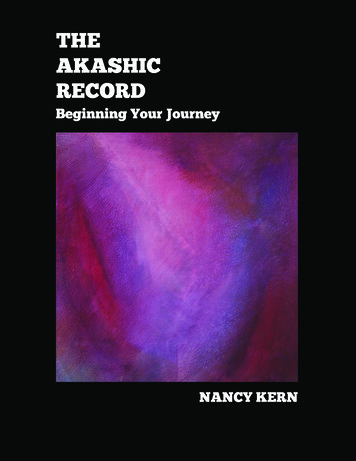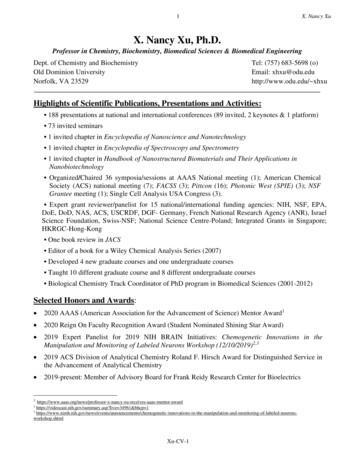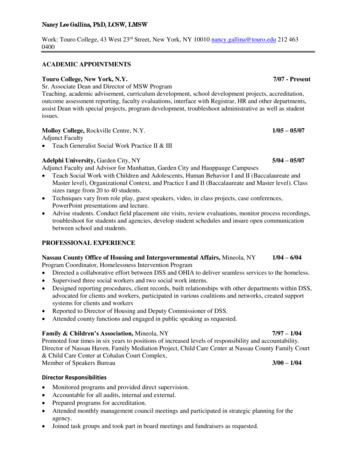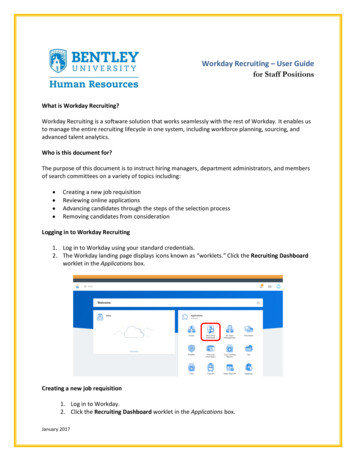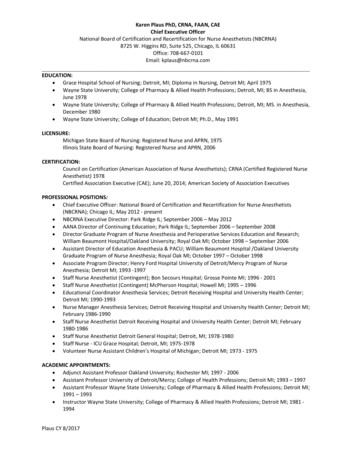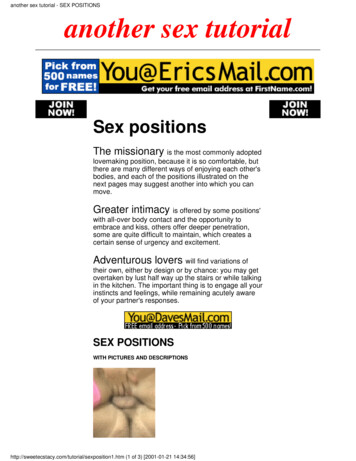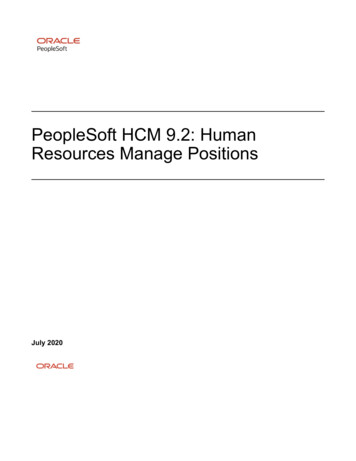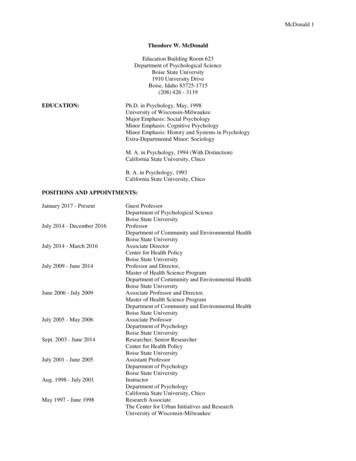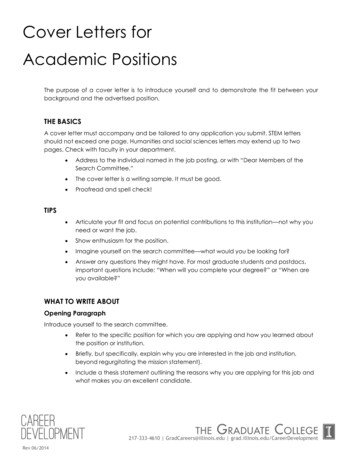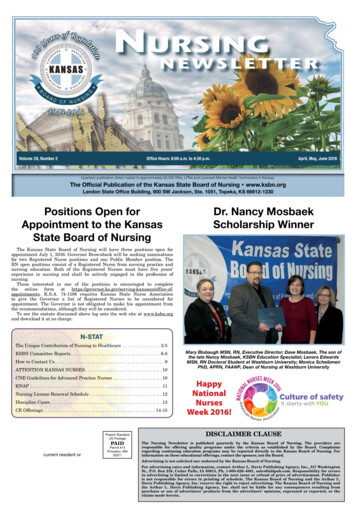
Transcription
Volume 29, Number 2Office Hours: 8:00 a.m. to 4:30 p.m.April, May, June 2016Quarterly publication direct mailed to approximately 62,000 RNs, LPNs and Licensed Mental Health Technicians in Kansas.The Official Publication of the Kansas State Board of Nursing www.ksbn.orgLandon State Office Building, 900 SW Jackson, Ste. 1051, Topeka, KS 66612-1230Positions Open forAppointment to the KansasState Board of NursingDr. Nancy MosbaekScholarship WinnerThe Kansas State Board of Nursing will have three positions open forappointment July 1, 2016. Governor Brownback will be seeking nominationsfor two Registered Nurse positions and one Public Member position. TheRN open positions consist of a Registered Nurse from nursing practice andnursing education. Both of the Registered Nurses must have five years’experience in nursing and shall be actively engaged in the profession ofnursing.Those interested in one of the positions is encouraged to completethe online form at ppointments. K.S.A. 74-1106 requires Kansas State Nurse Associationto give the Governor a list of Registered Nurses to be considered forappointment. The Governor is not obligated to make his appointment fromthe recommendations, although they will be considered.To see the statute discussed above log onto the web site at www.ksbn.organd download it at no charge.N-STATThe Unique Contribution of Nursing to Healthcare . . . . . . . . . . . . . . . . 2-5KSBN Committee Reports. . . . . . . . . . . . . . . . . . . . . . . . . . . . . . . . . . . . . 6-8How to Contact Us. . . . . . . . . . . . . . . . . . . . . . . . . . . . . . . . . . . . . . . . . . . . 9ATTENTION KANSAS NURSES. . . . . . . . . . . . . . . . . . . . . . . . . . . . . . . 10CNE Guidelines for Advanced Practice Nurses. . . . . . . . . . . . . . . . . . . . 10KNAP. . . . . . . . . . . . . . . . . . . . . . . . . . . . . . . . . . . . . . . . . . . . . . . . . . . . . 11Nursing License Renewal Schedule . . . . . . . . . . . . . . . . . . . . . . . . . . . . . 12Discipline Cases. . . . . . . . . . . . . . . . . . . . . . . . . . . . . . . . . . . . . . . . . . . . . 13CE Offerings. . . . . . . . . . . . . . . . . . . . . . . . . . . . . . . . . . . . . . . . . . . . . . 14-15Presort StandardUS PostagePAIDcurrent resident orPermit #14Princeton, MN55371Mary Blubaugh MSN, RN, Executive Director; Dave Mosbaek, The son ofthe late Nancy Mosbaek, KSBN Education Specialist; Lenora EdwardsMSN, RN Doctoral Student at Washburn University; Monica ScheibmeirPhD, APRN, FAANP, Dean of Nursing at Washburn UniversityHappyNationalNursesWeek 2016!DISCLAIMER CLAUSEThe Nursing Newsletter is published quarterly by the Kansas Board of Nursing. The providers areresponsible for offering quality programs under the criteria as established by the Board. Complaintsregarding continuing education programs may be reported directly to the Kansas Board of Nursing. Forinformation on these educational offerings, contact the sponsor, not the Board.Advertising is not solicited nor endorsed by the Kansas Board of Nursing.For advertising rates and information, contact Arthur L. Davis Publishing Agency, Inc., 517 WashingtonSt., P.O. Box 216, Cedar Falls, IA 50613, Ph. 1-800-626-4081, sales@aldpub.com. Responsibility for errorsin advertising is limited to corrections in the next issue or refund of price of advertisement. Publisheris not responsible for errors in printing of schedule. The Kansas Board of Nursing and the Arthur L.Davis Publishing Agency, Inc. reserve the right to reject advertising. The Kansas Board of Nursing andthe Arthur L. Davis Publishing Agency, Inc. shall not be liable for any consequences resulting frompurchase or use of advertisers’ products from the advertisers’ opinions, expressed or reported, or theclaims made herein.
Page 2 Kansas Nursing NewsletterApril, May, June 2016The Unique Contribution of Nursing to HealthcareMary Blubaugh MSN, RN, Executive Director;Rebecca Angell RN Student at Wichita StateUniversity; JoAnn Klaassen RN, MN, JD,Board President; Victoria Mosack PhD, APRN,PMH CNS-BC, Administrator at WichitaState UniversityRebecca AngellIt had been a sweltering July day in Kansas,and the sun was just starting to let up its intenseand fiery bake of the pavement that stretchedout over this large prairie country. I had justended a twelve-hour shift at the local hospital asa nurse technician and my legs were aching andmy stomach was growling for supper. I walkedthrough the steaming parking lot that was stillwrithing with discomfort from its long exposure tothe unfiltered elements. As I opened my car door,my eyes adjusting from the flicker of fluorescentlighting to the brilliance all around me, I finallybegan to reminisce on the day. The shift hadcome with its challenges: dismissals in one room,admissions in another, one patient in need of abedpan and another awaiting help to order dinner,I felt that in certain ways I had failed my patientsby not always attending as quickly as they mayhave wanted to their individual needs. However, Iknew I had done my best to not only care for theirphysical needs, but for their whole selves, givingmy all to put a smile on their face. At times therehad even been a lull, and those moments had beenmysteriously filled too. One patient just didn’tfeel lovely, and so I had brushed and braided herhair. Another patient had refused to talk to anymedical staff, so I had written her some notes andwaited and listened and eventually won her trust.At this moment, I realized that nurses have onedistinct role in healthcare, which no one else canquite match. Nurses have a unique and profoundcapability to meet a patient in the midst of deepvulnerability and bestow dignity upon them as awhole person: body, soul, and mind.It is easy for busy medical professionals toelevate the task of medical care above the personfor whom they are caring. A doctor can diagnoseand prescribe, but a nurse can rub a shoulder. Asurgeon can dissect and eliminate and reconstruct,but a nurse can massage and reposition andcomfort. A social worker can provide options forfuture well-being, but a nurse can listen whilea patient cries. A nurse is given the opportunityand the gift to elevate the whole person in need ofrestoration and healing above the task in need ofaccomplishment.Nurses come to work every day with one goal inmind: to leave their patients more dignified, morewhole and more comfortable than when they startedtheir shift. This drive and passion for the completewell-being for another individual is what called meto the nursing profession from the beginning. It isa sacred honor to be invited into the most exposingmoments of another’s life and, in return, offer hope,healing and presence. Being part of a nursing teamhas allowed me the opportunity not only to offer acold washcloth for a patient’s feverish forehead andclean up vomit that has soiled the bedding, but also tohold the hand of a patient who just received terrifyingnews of cancer and dry the tears of a mother whohas to see her child in pain. In these holy moments,nurses extend compassion, reverence, and genuineempathy. These actions are the ones that truly heala whole being. For these reasons, the role that nursesprovide to healthcare is truly irreplaceable.I once heard it said that to love someone is tobestow dignity upon them. So, as that July day cameto an end, and I lay in my bed that night resting myaching legs, I was satisfied. I was satisfied that I havethe opportunity, through my profession, to be the onewho can meet a patient in a fully vulnerable state,and yet love, respect and care for the valuable, wholeand dignified person that they are. I was satisfiedthat I am given the gift of serving these patients,caring for their physical needs, and also the needsof their soul and mind. Yet, mainly, I was grateful toknow that I have the opportunity, like many nursesaround me do every day, to leave my patients in abetter place than when I first began to care for them.Board Meeting Schedule2016 Board Meetings March 29 & 30 June 14 & 15 September 13 & 14www.ksbn.orgPublished by:Arthur L. DavisPublishing Agency, Inc.
April, May, June 2016Kansas Nursing Newsletter Page 3The Unique Contribution of Nursing to HealthcareMary Blubaugh MSN, RN, Executive Director;Jade Holmes RN Student at the University ofKansas; JoAnn Klaassen RN, MN, JD,Board PresidentJade HolmesIt was a Friday morning around 10 a.m. when Ireceived a phone call from my grandmother, whois one of the most important people in my life. Sheexplained to me that she had been laying on herbedroom floor for two days and was unable to getup. She had been experiencing severe back painand was on her way to the hospital. I was shockedby the idea and image of my grandmother beingso sick and in need of medical attention. On mydrive to the hospital, thoughts raced through mymind regarding her health and medical needs.When I arrived in her hospital room a nurse wasat her bedside holding her hand with a contagiouscomforting smile. Nursing is much more than justa job; it is a profession that holds many uniquecharacteristics that makes it one of the mostimportant professions within our health caresystem. The direct patient care and dedication toeducation and knowledge within the professionis what makes nursing unique and sets it apartfrom any other health care profession. The nursein my grandmother’s hospital room exemplifiesthis attention to patient care and understandingby the way she provided both relief and assistanceto not only my grandmother, but also to my familythrough her unique ability to empathize with ouremergency.One of the most powerful components of beinga nurse is the relationship built with patientsand families. Unlike physicians, nurses arefocused on the illness or wellness of the patient,not necessarily the etiology and presentationof the disease state. This concentration on theindividual patient gives nurses the unique abilityto provide direct patient care and advocate fortheir needs and interests. The direct patient carenurses provide makes nursing a trusted, valued,and unique profession compared to all otherhealthcare fields. In this role, nurses act as bothcaregiver and representative for the patient, asthey are the ones who are always at the bedsideand are always listening to patient and familyneeds. Along with patient trust, nurses arealso unique in their relationship and teamworkcollaboration abilities with physicians and otherhealth care providers. Nurses are the foundationof care for each patient and have the power tobring together multiple teams to provide the bestpossible care.Nurses have not only the unique ability toprovide direct patient care, but also possess avaluable level of education that provides patientswith physical, emotional, and psychologicalrelief. The education nurses receive is of upmostimportance because it is the foundation ofpractice. The combination of medical science,biological science, and critical thinking skillsprovide the groundwork for nurses to be the bestprovider of care and patient advocate available.Nurses are taught to continue to expandtheir knowledge and to use their analyticalcommunication skills daily. This level of attentionto education and knowledge is unique to thenursing and a value that the profession holds veryhigh.As I continue my education to become a nurse,I will never forget the contagious smile on theface of the nurse in my grandmother’s hospitalroom. The level of care she gave so naturally iswhat sets nursing apart from all other healthcare professions. Nurses are essential to thehealth care system because of their educationalfoundation and patient focused care, and thisis what makes them unique. It is important tocontinue this level of integrity and dedication tothe patient to ensure the best experience possiblefor patients and family. Nurses can impact everypatient they encounter, and that alone, is whatmakes for remarkable health care.
Page 4 Kansas Nursing NewsletterApril, May, June 2016The Unique Contribution of Nursing to HealthcareMary Blubaugh MSN, RN, Executive Director;Susan Sukstorf PN Student at Johnson CountyCommunity College; JoAnn Klaassen RN, MN,JD, Board President; Annette Rodriguez RN,Instructor at Johnson County Community CollegeSusan SukstorfOver the last 153 years, nursing has had animpact on the way that health care is viewed inthe United States. Beginning during the CivilWar, Clara Barton took volunteers into thefield to treat wounded soldiers, and, in 1893,Lillian Ward and Mary Brewster expanded thenursing practice by going into the communitiesof the poor and needy in New York City. All ofthese women were following in the footsteps ofFlorence Nightingale, who set forth the firststandards of nursing care, teaching aboutnutrition, sanitation, and meeting patient needs.Today, health care is like a puzzle, and all thepieces must fit together. Nursing continues toexpand on the discipline of health care by beingteachers, resources, care givers, communicators,and the most important contact for treatingpatients and meeting their needs. All of theseduties are essential parts of the puzzle, and allof the pieces are needed to complete the picture,and understand the concept of nursing.Nursing is the first line of defense. Thenurse sees and hears all, so he or she is thefirst to react to a change in physical, spiritual,or emotional condition. The nurse is constantlyat the bedside. It is the nurse who constantlychecks in on the patient, assessing daily forsigns of changes in condition or behavior. Thenurse is the one who is making contact with thepatients and talking with him or her. The nurseuses her loving, caring, empathetic qualities toreduce stress, listen patiently, and comfort thenew resident. This is the main way that needsare met. It is the nurse who listens to what thepatient says calmly, adds that subjective pieceto his or her own objective observations, andanalyzes a situation. At that point, the nursemay begin intervening and solving the problemsalone, or communicate with the physician. Itis the nurse, who uses her skills effectively,who can assess, analyze, plan and implementa strategy, and reevaluate to see if the goals,set forth, were met, or know when physicianintervention is needed. Some of the needsaddressed might be physical, but they could alsobe emotional or spiritual. These are not minorduties. They are essential to total patient care.The physician values and trusts the nurse to dohis or her job competently and completely, whichis vital to a doctor’s correct diagnosis and/orprescription. This is the first piece of the rkers, chaplains, or doctors. In addition tocommunicating the patients’ vital informationand symptoms to the physicians, the nursemust also be able to talk with the appropriateresources and staff. Nursing is not done inisolation. It is done as a member of a care team.A nurse must be able to effectively convey thepatient needs to other nurses through means ofa morning report, to aides, who will be assistingin the implementation of daily requirements,and to the Director of Nursing, who is in chargeof the facility and nursing staff. One must beable to express clearly, in words, what is beingdone and for what purpose. This informationis also given to the occupational, speech, andphysical therapists, who will also be sharingin the duties put forth in the care plan. Thenurse must be able to talk with and listen toall of these people, as they must constantlywork together, and stay abreast of the changesin condition, whether improvement or decline,so that priorities can be reevaluated and goalschanged for the benefit of the patient. This is thesecond piece of the puzzle.The communication does not stop withthe staff. Communicating with the patient isessential. The nurse gathers information, fromdiet and exercise to pain and comfort. All ofthe data provided to the nurse upon admissionis vital and, combined with observation, is usedto assess the patient, but the communicationdoes not stop there. It is an ongoing process,and reassessed daily. Upon discharge, thecommunication becomes focused on the ordersfor the patient’s recovery in another location,be it at home or another facility. The nurse thenbecomes a teacher. She must demonstrate andthen check the comprehension of the patient onequipment usage and orders from the doctor.She may go over bathing instructions, woundcare, medication lists, changes in diet, sideeffects of medications, and even instructionsabout when to call the doctor after a surgery orprocedure. She answers questions and clarifiesmisunderstandings. She is essential for adischarge to go smoothly. This is just one of hermany tasks. The final pieces of the puzzle areprovided.As one can see, the nurse is in a uniqueposition. She is a communicator, facilitator,organizer, implementer, and teacher. She is thefirst, middle, and last pieces of the healthcarepuzzle. Without the nurse, the other piecesdo not fit together, but with the nurse’s skilland training the job is done effectively andcompletely, and the total health care puzzle isfinished.
April, May, June 2016Kansas Nursing Newsletter Page 5The Unique Contribution of Nursing to HealthcareMary Blubaugh MSN, RN, Executive Director;Melody Vathauer PN Student at HutchinsonCommunity College; JoAnn Klaassen RN, MN,JD, Board President; Sandy Pangburn MSN,RN, Administrator/Coordinator at HutchinsonCommunity CollegeMelody VathaurWhen I tell people I am going to school to be anurse, their typical first comment is similar to this.“So, you’re going to empty bed pans for the rest ofyour life.” Those individuals couldn’t be more wrongand uninformed. There are so very many aspects ofthis field that make what nurses do unique. Nursingis both an art and a science. Tied to that is the abilityto think critically. Critical thinking is a large part ofour job with each day being different, certain protocolsbeing changed due to evidence based practice, andthe fact that we never stop learning. It takes a broadset of skills: art, science, and critical thinking; tosuccessfully practice as a nurse and that is whatmakes what we do so unique.Nursing is science, how we put that science intopractice is an art. Science and research show us whateffectively treats disorders and diseases. How a nursechooses to deliver care, medications, and therapeuticmeasures is what makes nursing an art. The scienceis what we are taught. We are taught how to carefor patient beyond science, but it takes a specialset of skills to do that. We are loving, caring, andcompassionate; those attributes can’t always be taught.Those attributes are part of what makes us unique.We must have strong backs, hearts, and minds. Wecomfort those in time of need and are looked upon ashealers. We are our patients strength when they areweak, their advocate when nobody else is there, weare their voice when they can’t speak. Our patientsrely on us to heal, protect, and comfort them. Alongwith having all those attributes, we have to be criticalthinkers.As nurses, we are faced with new challenges eachday. This is why critical thinking is essential. We don’tcontinuously see the same diseases and disordersday after day. We have to be on our toes for what isgoing to come at us next. We not only have to look atthe disease for what it is, the signs and symptoms,etiology, treatment, prognosis, but the patient. Thepatient will tell us more than what a textbook says.Not every disease process or disorder is “textbookperfect.” We have to apply all of the knowledge wewere taught in school, all that we’ve learned in ourclinical experiences, and what the patient tells us.We constantly have to dig deeper to find what is bestfor a particular patient. Not every individual is thesame, nor are two people struggling with the samedisease or disorder. We must look
State Board of Nursing The Kansas State Board of Nursing will have three positions open for appointment July 1, 2016. Governor Brownback will be seeking nominations for two Registered Nurse positions and one Public Member position. The RN open positions consist of a Registered Nurse from nursing

